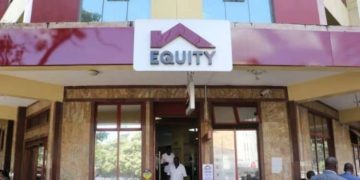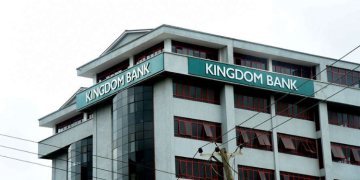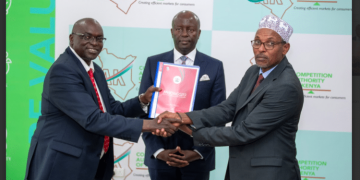The Kenya National Examinations Council (KNEC) has revised its guidelines for the equation of school and post-school foreign certificates.
Equation is the process by which KNEC evaluates and compares foreign academic certificates to Kenyan standards.
The certificate equation process is important for individuals who have studied outside Kenya and wish to use their academic qualifications locally, whether for further studies, employment, or school transitions under CBC.
Moreover, this means that anyone who has studied outside Kenya and plans to use their academic papers locally, whether for school, college, or a job, will now need to follow the new guidelines set by KNEC.
Further, the council stated in a April 2, notice that all applications for certificate equation must now be submitted exclusively through the Query Management Information System (QMIS) platform.
According to KNEC, both school-level (e.g., O-Level, A-Level) and post-school qualifications (diplomas, technical training certificates) are eligible for equation, provided they meet specific criteria.
Also Read: KNEC Announces Teacher Training Program with Guaranteed Contract Opportunities
KNEC Issues Conditions for Equation to Applicants
Consequently, KNEC has issued guidelines, reminders and requirements for individuals applying for Certificate Equation explaining that the certificates must have been awarded by an accredited examining board or an institution authorized by law to conduct examinations and issue certificates.
According to the new guidelines, institutional-based certificates, whether local or international are not eligible for equation.
To be eligible for equation by KNEC, the applicant must have met the entry requirements for the corresponding course(s) offered by KNEC at the time of application.
Additionally, verification by the awarding institution is mandatory. Applicants seeking the equation of Advanced Level certificates must provide a copy of the corresponding Ordinary Level certificate.
“Both certificates should be submitted to KNEC, and they must be authenticated. A confirmation of authenticity must be sent directly to KNEC by the awarding institution,” noted the council.
Also, the applicant must have obtained a minimum Division II in the Ordinary Level or a KCSE mean grade of C (Plain).
“The applicant must have completed the required mandatory subjects to meet the awarding rules. For instance, to equate a certificate to KCSE examination, the applicant must have taken at least seven (7) subjects, including Mathematics, a language, and any other five (5) subjects,” explained KNEC.
The guidelines also explained that applicants must have completed the appropriate number of years or contact hours of study at the specific level, as per KNEC requirements.
Also Read: REVEALED: List of Top Nine Universities in Kenya
Verification and Translation of Certificates
Individuals holding foreign qualifications who wish to join any educational institution offering KNEC examinations have been directed to first obtain an equation from KNEC before enrolling.
Additionally, anyone seeking an equation for a certificate written in a language other than English or Kiswahili must have the certificate(s) translated by the relevant Embassy, Alliance Francaise for French, or any other recognized institution for other languages.
“Certificates submitted for equation must be verified by the examination body that issued them.
“Verification results should be sent directly from the examination body to the Chief Executive Officer, KNEC, via email at [email protected]. Equation processing will only begin once this confirmation has been received,” noted the council.
How to Apply
Once a candidate has met the requirements detailed, they will be required to provide the following additional information.
The applicant is required to write a request letter addressed to the Chief Executive Officer, Kenya National Examinations Council, P.O. Box 73598-00200, City Square, Nairobi, stating the reason for the certificate equation.
Further, the letter should include the postal address of the institution or organization that requested the equation, as well as the applicant’s mobile number and email address for communication purposes.
“Heads of institutions seeking the equation of primary school qualifications must also specify the year the student/learner joined the school, the level they entered at, and their current level.”
Subsequently, the applicant is required to scan and upload the request letter, along with all certificates or the last two years’ progress reports for learners joining CBC.
“Include a copy of the ID card, passport or birth certificate (for minors under 18 years). Clients seeking the equation of Ordinary/Advanced Level qualifications must provide a copy of the Primary Level certificate,” KNEC detailed.
A fee of KSh3,480.00 will be charged for each equation letter issued. This fee includes dispatch by registered mail.
Those who wish to receive their equation letter via email should provide the email address of the institution where the letter should be sent and pay an additional fee of Ksh928 for the service.
Payments should be made via MPESA, and the system will generate a payment prompt to the applicant’s QMIS status. Payments made through any other method will not be valid.
Follow our WhatsApp Channel and X Account for real-time news updates.










![[Live Blog] Thousands Line Up For Raila’s Final Viewing At Mamboleo A Photo Of Kneyans Viewing The Body Of Raila Odinga At Mamboleo. Photo/Citizen](https://thekenyatimescdn-ese7d3e7ghdnbfa9.z01.azurefd.net/prodimages/uploads/2025/10/a-photo-of-kneyans-viewing-the-body-of-raila-odinga-at-mamboleo.-photocitizen-360x180.png)



































































